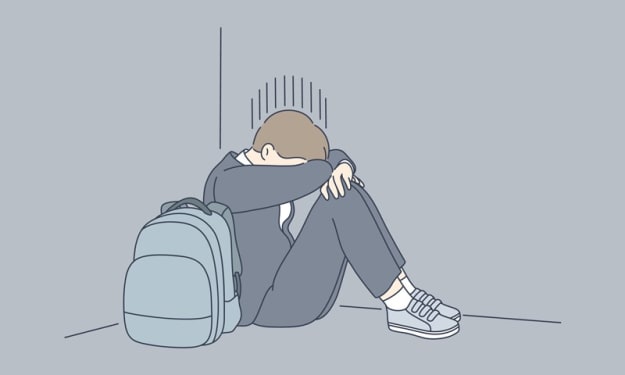What is Borderline Personality Disorder?
What BPD is, How to Cope & How to Help, by Zoe Frenchman

Borderline personality disorder is a mental disorder characterized by unstable moods, behaviors, and relationships, and it usually involves general instability, impulsivity, relationship difficulties, intense fears of abandonment and rejection, distorted self-image, and often self-harm. I wanted to make this video to kind of break down what borderline is, how to manage it and cope with it if you struggle with it, and if you don’t personally struggle with it, but you know someone who does, how you can help them. I was inspired to write this article based on an interaction I had in the comments on YouTube, so thank you to that viewer for the inspiration.
My Story
I was diagnosed with anxiety and depression when I was 12, I’ve struggled with different eating disorders since I was 12 and developed the most prominent one, anorexia when I was about 15. I was diagnosed with BPD when I was 16, and my therapist at the time was hesitant to make the diagnosis because typically, people aren’t diagnosed with BPD until they’re at least 18. Still, my symptoms almost perfectly aligned with the symptoms of BPD, so I was diagnosed with it. I mention my other mental health issues because they often go hand in hand with BPD. OCD and ADHD are also often comorbid conditions with BPD.
What is it?
People with BPD have unstable moods and can act recklessly. They have a hard time managing their emotions. If you also have BPD, you may have problems with daily tasks, obligations, and life events. I often find it difficult to motivate myself to engage in basic self-care intrinsically. I often rely on external motivators to keep me going, which can be helpful sometimes, but the constant dependence isn’t healthy. Keeping jobs and relationships is another area of trouble for some people with BPD. And you may use food, alcohol, or other substances to cope. For me, I often restrict myself as a way of coping. I also find it difficult to be unoccupied. I have this perpetual need to be productive, which I’ve discussed in previous videos, which partially comes from my BPD. On the other hand, I also often have trouble concentrating, which is another common symptom. For me, it has a lot to do with the fact that I have a lot going on in my head at all times, which impacts my attention span a lot.
Benefits of Coping
Learning new ways to cope provides possible benefits. These techniques may: Build confidence in your ability to handle difficult situations that come up; Improve your ability to function well even when in stressful situations continuously; Reduce the intensity of emotional distress; Reduce the likelihood that you will do something harmful in an attempt to escape from the emotional distress; Reduce the likelihood that you will engage in behaviors that destroy relationships, such as physical aggression, when you are upset; And ultimately reduce your overall experience of emotion dysregulation.
Treatment
Some ways of coping with and managing BPD that I’ve found to be effective are first and foremost, medication and therapy, specifically DBT–or dialectical behavioral therapy. Psychiatry and therapy are essential for the management of any mental health disorder, but especially for more severe disorders like BPD.
How to Cope
Some smaller, but really beneficial coping mechanisms you can do on your own in a moment when you need to use them include exercising, listening to music, writing/journaling, and engaging in some sort of activity like playing an instrument, cleaning, dancing, taking a walk, or any sort of distracting, engaging activity. Writing and journaling are the most helpful, but I also find playing my guitar, editing videos, and cleaning to be advantageous. What works the best obviously depends on each individual person, but it’s important to keep trying until you find what works for you and try to stick with it. Keep using your coping skills continuously for maximum effectiveness. Another technique to use is to ride it out. The ability to control impulsive behaviors is a crucial aspect of emotional regulation. People with BPD often struggle to do this effectively. Building your ability to tolerate distress and almost sustain an emotion and ease out of it as it passes can help prevent emotional outbursts from happening. With practice, you can build your distress tolerance skills. Try to maintain awareness of the emotion and identify what you’re feeling. Try to remind yourself that what you’re feeling is temporary. Then, try to accept what you’re feeling. And try to remember that your thoughts don’t dictate your actions. You can set a timer on your phone for 10 minutes. Wait for those 10 minutes and practice riding out the emotion. It’s a helpful coping skill that I practice when I need to.
How to Help
Another important aspect of managing borderline personality disorder is for the loved ones of those struggling to be able to help them. So, coming from someone who has been diagnosed with the disorder and struggles with it daily, here are some things that you can do, that my loved ones have found to help manage my BPD, especially during an episode. Be patient, don’t judge at all, set clear boundaries, remind them of their positive qualities, learn their triggers so you can try to avoid them, provide distractions, be calm and consistent, and plan ahead so you’re not stuck not knowing what to do when an episode comes up. I understand that people with BPD can be difficult to deal with, to put it plainly. I completely understand that, and we often are hyper-aware of how difficult we can be and for me, I often expect people to wind up abandoning or rejecting me. But suppose you’re someone who has some sort of relationship with someone with BPD and you feel a need to make changes for both of your sakes. In that case, you can change your relationship by managing your own reactions, establishing clear limits, and working toward improving communication between you and your loved one. There’s no instantaneous or magical cure for BPD but with the proper treatment, support, and motivation, many people with BPD can and do get better. And their relationships can become more stable and rewarding. People with BPD with the most support and stability at home actually tend to show progress sooner than those whose relationships are more unstable, unhealthy, and insecure.
Final Thoughts
BPD is a complex disorder that requires tactful care. But with patience, persistence, consistency, proper support, and proper treatment, people with BPD are perfectly capable of thriving and maintaining healthy, steady relationships.
About the Creator
zoe frenchman
I’m Zoe, I’m 21, and I’m an aspiring writer, filmmaker, musician, & mental health advocate. I’m a poet and content writer currently enrolled in the Creative Writing BFA program at Full Sail U!






Comments
There are no comments for this story
Be the first to respond and start the conversation.